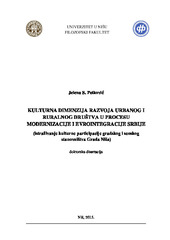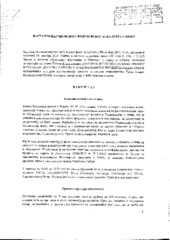Приказ основних података о дисертацији
Kulturna dimenzija razvoja urbanog i ruralnog društva u procesu modernizacije i evrointegracije Srbije
| dc.contributor.advisor | Božilović, Nikola | |
| dc.contributor.other | Stojković, Branimir | |
| dc.contributor.other | Stevanović, Branislav | |
| dc.contributor.other | Marković Krstić, Suzana | |
| dc.creator | Petković, Jelena S. | |
| dc.date.accessioned | 2020-07-03T16:18:46Z | |
| dc.date.available | 2020-07-03T16:18:46Z | |
| dc.date.issued | 2015-12-22 | |
| dc.identifier.uri | https://nardus.mpn.gov.rs/handle/123456789/5162 | |
| dc.identifier.uri | http://eteze.ni.ac.rs/application/showtheses?thesesId=2777 | |
| dc.identifier.uri | https://fedorani.bg.ac.rs/fedora/get/o:1051/bdef:Content/download | |
| dc.identifier.uri | http://vbs.rs/scripts/cobiss?command=DISPLAY&base=70052&RID=1545158655 | |
| dc.description.abstract | This dissertation supports the claim that the social development and modernization of Serbia, in addition to the dominant economic, political and technological changes, should also be viewed in the context of the changes which occur in the cultural sphere. Naturally, bearing in mind that the cultural capacities in the current, modern society are recognized more and more often as developmental resources, and culture as the fourth dimension of sustainable development (in addition to the economic, social and ecological one). The cultural dimension of development is viewed through the relation that exists between cultural factors – tradition, values, cultural practices, way of life – andsocial development, with a study of the quality and intensity of their interrelations. The first part of this dissertation is devoted to the theoretical problematization of the proposed, topic, the socio-cultural and historical analysis approach to the current state of the culture of the urban and rural society of Serbia and the analysis of the relevant findings of researchcarried out at the European and local level. In the second part of this dissertation, the results of an independent empirical study of the cultural dimension of development are presented and analyzed, operationalized by a studyof the cultural participation of the citizens of the city of Niš. Special attention was paid to the understanding of the values and cultural practices (activities, needs, habits) of the territorial subcultures – the urban and rural one, and thus their relationship towards the processes of modernization and Serbian European integrations, as well as their position and developmental role in these processes. The study was based on the complementary nature of the descriptive and explanatory approach, with an application of various research methods (content analysis, comparative-analytical method, statistical methods and so on). The basic research instrument was the combined questionnaire. In-depth analytical insight into the hierarchical reality of the modern Serbian society and culture, as well as an analysis of the established indicators of the study confirm the initial hypothesis that culture is not perceived as a specially important dimension of personal and social development in the processes of the modernization of Serbian society. An analysis of the participation of the respondents in cultural activities (cultural spending, production and cultural interaction), and an analysis of their cultural habits and needs, have confirmed a generally limited extent and low level of cultural participation and socio-cultural activism. For a great majority of the respondents from the city of Niš, especially those who reside in rural or city-adjacent areas, who have a lower education and who feel the negative economic effects of the transition, culture does not provide any sense for their daily existence, nor does culture represent an essential assumption of change in their own position in society and the transformation of society as a whole. Numerous research results have confirmed the social predisposition of cultural practices and the ambivalent relation of the respondents to the process of Serbian Europeanintegrations.In addition, certain value changes among the respondents living in the rural areas were noted, in terms of a weakening of the rigid, non-critical bonding to tradition towards a more flexible relationship towards change and greater intercultural sensitivity. This indicates that the modernization of society has conditioned a series of essential transformations of basic values and patternsoflife, especially the patterns of human interaction and communication, through the incessant manifestation of a strong interrelationship between the urban and rural society and their cultures. The general conclusion is that the cultural dimension of development is not adequately recognized or acknowledged as one of the most important elements of the social transformation, modernization and European integrations of Serbia. The crucial factor in the current social crisis can be found, among other things, in the serious violation of the developmental and emancipatory role of culture in the modern social changes in Serbia. It is necessary to increase the awareness of the citizens and representatives of the government of the importance of culture and to decentralize the cultural politics of Serbia, so as to increase socio-cultural involvement, the extent and quality of the cultural participation of the population at the local level. All this, in the context of the development of supportive cultural values (education, creativity, enterprise, respect of diversity, cooperation) and the realization of progressive cultural goals (an improvement in the educational structure of the society, a decrease in social and cultural isolation, the domination of traditionalist values, an improvement in quality cultural production and reception). This will be a significant contribution to the development of the cultural development of the urban and rural society of Serbia, but also the modernization of society as a whole. | en |
| dc.format | application/pdf | |
| dc.language | sr | |
| dc.publisher | Универзитет у Нишу, Филозофски факултет | sr |
| dc.relation | info:eu-repo/grantAgreement/MESTD/Basic Research (BR or ON)/179074/RS// | |
| dc.rights | openAccess | en |
| dc.rights.uri | https://creativecommons.org/licenses/by-nc-nd/4.0/ | |
| dc.source | Универзитет у Нишу | sr |
| dc.subject | kultura | sr |
| dc.subject | culture | en |
| dc.subject | kulturna dimenzija razvoja | sr |
| dc.subject | kulturna participacija | sr |
| dc.subject | kulturna politika | sr |
| dc.subject | društveni razvoj | sr |
| dc.subject | modernizacija | sr |
| dc.subject | evrointegracija | sr |
| dc.subject | urbano društvo | sr |
| dc.subject | ruralno društvo | sr |
| dc.subject | the cultural dimension of development | en |
| dc.subject | cultural participation | en |
| dc.subject | cultural politics | en |
| dc.subject | social development | en |
| dc.subject | modernization | en |
| dc.subject | European integrations | en |
| dc.subject | urban society | en |
| dc.subject | rural society | en |
| dc.title | Kulturna dimenzija razvoja urbanog i ruralnog društva u procesu modernizacije i evrointegracije Srbije | sr |
| dc.type | doctoralThesis | en |
| dc.rights.license | BY-NC-ND | |
| dcterms.abstract | Божиловић, Никола; Стојковић, Бранимир; Стевановић, Бранислав; Марковић Крстић, Сузана; Петковић, Јелена С.; Културна димензија развоја урбаног и руралног друштва у процесу модернизације и евроинтеграције Србије; Културна димензија развоја урбаног и руралног друштва у процесу модернизације и евроинтеграције Србије; | |
| dc.identifier.fulltext | https://nardus.mpn.gov.rs/bitstream/id/55559/Petkovic_Jelena_S.pdf | |
| dc.identifier.fulltext | https://nardus.mpn.gov.rs/bitstream/id/55558/JELENA_S_PETKOVIC.pdf | |
| dc.identifier.fulltext | http://nardus.mpn.gov.rs/bitstream/id/55559/Petkovic_Jelena_S.pdf | |
| dc.identifier.fulltext | http://nardus.mpn.gov.rs/bitstream/id/55558/JELENA_S_PETKOVIC.pdf | |
| dc.identifier.rcub | https://hdl.handle.net/21.15107/rcub_nardus_5162 |



